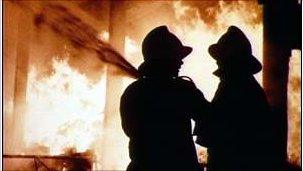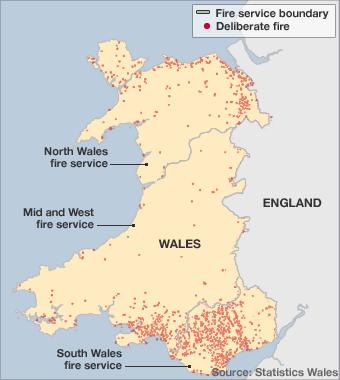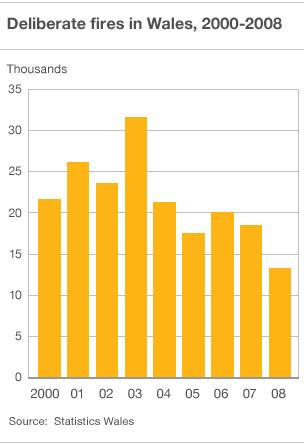'Deliberate fires drop' in Wales
- Published

There were 42 fatalities from fires between 2000 and 2008
The number of fires started deliberately in Wales has dropped by more than 40% since the start of 2000, according to the latest figures.
There were 13,194 fires started deliberately in 2008, the year the most recent detailed figures are available, down from 21,582 in 2000.
Wet summers and better liaison between agencies are behind the drop, said Mick Flanagan, of South Wales fire service.
"People do not understand the impact arson has on the community," he said.

Deliberate fires in Wales in 2008
Mr Flanagan, head of the Fire Crime Unit, said a series of wet summers had kept young people off mountainsides.
"Wet summers made the grass that much harder to burn," he said.
"We have also done a lot of work with children helping them understand the implications of deliberate fires."
Recent figures showed that three-quarters of all grass fires in Wales are started deliberately.
"The figures are encouraging but there is an awful lot more that we need to do," said Mr Flanagan.
"The figures are nowhere near where we need them to be. Arson in our communities is still very high, and much higher than areas in the rest of the UK."
A third of all fires attended by Wales' three fire services are started deliberately.
Forty-two people were killed and more than 1,000 people were injured in such fires between 2000 and 2008.

The figures, released by the Welsh Assembly Government, external, show that across Wales the number of all types of deliberate fires dropped by 58% by 2008 since the peak in 2003.
The numbers of the most serious types of fire have dropped by 58% between a peak in 2001 and 2008.
The figures also show school fires started deliberately have dropped by almost 50% between 2000 and 2008, while the numbers of deliberate car fires has dropped 58% in the same period.
Mr Flanagan said: "We have worked with headteachers and caretakers to minimise the risks - talking to them about security and waste management.
"We have also run school initiatives, like Fire Watch, making children fire wardens for their own schools."
The worst year for arson over the last decade was 2003, which was a particularly warm summer, said Mr Flanagan.
"We were just moving from fire to fire," he said.
"But it was a turning point when we realised more had to be done."
- Published27 August 2010
- Published13 July 2010